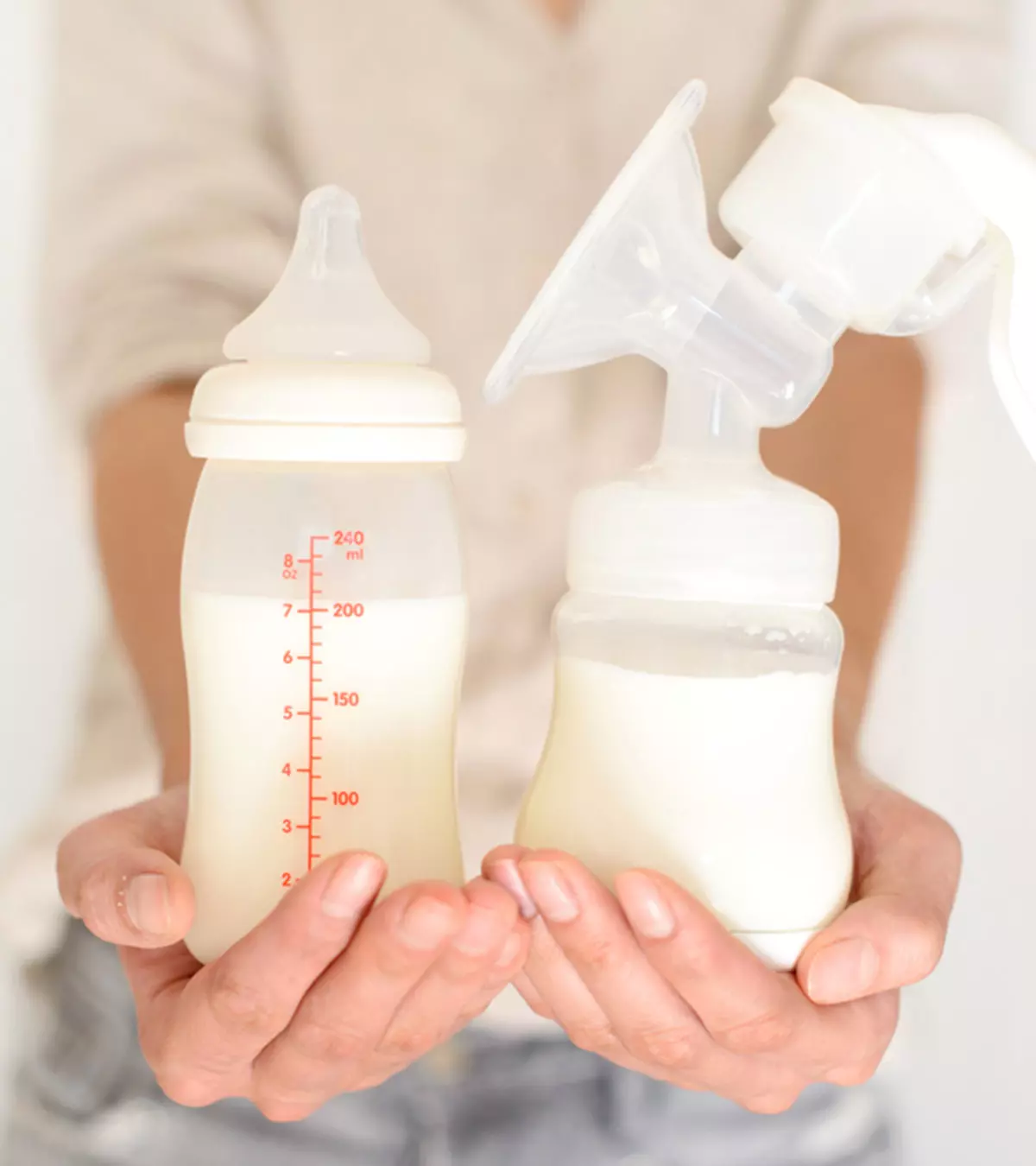
Image: iStock
Giving birth to the child and caring for them can be physically exhausting. In addition, due to constant sleep deprivation for the initial few weeks or months of an infant’s life, it is not unusual for mothers to fall asleep while breastfeeding. During breastfeeding, the body releases oxytocin. It is a hormone that plays an important role in inducing sleepiness during breastfeeding as it can make one feel calm and relaxed. It’s important to understand the effects of falling asleep while breastfeeding to ensure you and your baby are safe. Continue reading this post as we talk about the reasons, possible risks, and ways to prevent mothers from falling asleep during breastfeeding.
Key Pointers
- Breastfeeding mothers can fall asleep during feeding sessions due to tiredness, feeling secure, or the room setting.
- Oxytocin and prolactin hormones produced during breastfeeding also help relax the mother. However, falling asleep during feeding may be dangerous for the baby.
- Finding ways to stay awake while nursing, such as using an erect sitting posture, setting an alarm, and seeking help from family and friends can help.
- Maintaining a healthy diet and scheduling the baby’s feeding times to get ample rest and prevent falling asleep during breastfeeding.
Does Breastfeeding Make You Sleepy?
Breastfeeding may not directly make you fall asleep, but the reasons associated with breastfeeding might make a nursing mother experience drowsiness.
The following are the common reasons for mothers of breastfed babies to fall asleep while breastfeeding.
1. Tiredness

Newborn babies usually feed every two to three hours or 8-12 times in 24 hours (1). The schedule leads to a lack of continuous sleep for the mother. Babies also have comfort nursing, thus extending the breastfeeding duration. Infants resort to comfort nursing even if they are not hungry, to drift off to sleep, or when they are tired, or if they want the mother’s touch and attention.
2. Feeling secure
Mothers might feel stressed out and concerned about their baby’s safety. They might worry that the baby would roll over from the cot or be suffocated (2). The sense of security while holding the baby could all cause a nursing mother to fall asleep while breastfeeding.
3. Room setting
The baby is usually fed in a dark, well-ventilated room in a quiet and calm environment. The mother is also likely to be seated in a comfortable sleep surface or chair. Such room settings make for a comfortable breastfeeding experience and make you doze off.
4. Oxytocin
Oxytocin is a hormone that makes the milk flow through the breasts. The hormone also induces a calm, relaxed, and sleepy feeling in breastfeeding mothers (3)
5. Prolactin

It is an important hormone for the production of breast milk. It makes the mother feel a sense of relaxation, thus leading to sleepiness at night (4).
Is It Harmful To Fall Asleep While Breastfeeding?
It is not advisable to fall asleep while breastfeeding the baby as there is a risk of feeding-related infant deaths. It can be harmful for the baby due to the following reasons.
- The baby might fall out of your arms if you are sleeping while holding the baby.
- The baby might get suffocated against your chest.
Feeding moms may fall asleep for various reasons. But, there are some ways to manage to stay awake during infant feeding.
Things To Remember When You Are About To Breastfeed
If you tend to fall asleep, then the following measures could help you manage it better (9).
- Correct posture

Set yourself against a comfortable pillow or in a comfortable chair. Studies by the American Academy of Pediatrics (AAP) indicate that compared to those seated on the bed, mothers who feed sitting on a chair are less likely to fall asleep while feeding (10). Avoid a cozy surface, as it might make you drowsier. It is also best to avoid couches and armchairs as these may increase the risk of accidents if you fall asleep. Choose a sitting surface with raised edges so neither you nor your baby rolls over on falling asleep. Identify the safe nighttime feeding spaces in your house and utilize them.
- Set an alarm
Before you begin breastfeeding, set the alarm in your phone or alarm clock. Keep the volume and vibration of the phone low to prevent disturbing the baby. Also, keep the phone or clock at a safe distance from the baby.
- Ask for your partner’s help
Ask your partner or a family member to wake you up if you fall asleep. Alternatively, you may even have them place the baby back in the crib if you both happen to doze off while nursing. You can have a peaceful, relaxed, and stress-free sleep nursing session if you have someone around.
- Keep the surroundings clear
Do not keep potential hazards like a cup of hot beverage, medications, or sharp objects around while breastfeeding the baby. It can help prevent accidents in case you fall asleep, and the baby is still awake. Remove all toys and loose bedding, such as pillows, quilts, comforters, and blankets, if you are feeding on the bed. This may help you prevent the risks of strangulation or suffocation.
How To Stop Yourself From Falling Asleep While Breastfeeding?
Identify the factors that make you sleepy and try avoiding them. Here are some tips to help prevent falling asleep while breastfeeding (11).
- Try to get enough rest. Sleep when the baby goes to sleep. Continuous nighttime sleep may not be possible, so try to get some daytime naps, in sync with your baby’s sleep habits.
- Seek help from your partner, friends, or family members to feed expressed breast milk to the baby while you get some rest.

- Eat a wholesome diet and consume enough calories daily. It will help keep your energy levels up and maintain a sufficient milk supply. Breastfeeding burns up to 500 calories daily therefore intaking enough calories of a well-rounded diet and staying hydrated are essential.
 Quick fact
Quick fact- Keep yourself engaged in some activity like reading a book, listening to music, watching TV, or playing a game on your phone to stay alert and not fall asleep.
- Identify the baby’s feeding cues and feed them on time. This will prevent them from getting cranky.

- Try adjusting your baby’s feed and sleep cycle. Babies instinctively start feeding if they are snuggled up the mother’s chest. Lay your baby against your body in a way that his/her stomach and chest are in contact with your skin. This is known as biological nurturing (5). The baby will indulge in feeding even in light sleep by this technique. It could help prevent a disturbed sleep cycle for the baby. It eventually allows the mother to have a better sleep.
- If you are experiencing chronic exhaustion or fatigue during breastfeeding, consult a lactation consultant for help.
 Quick tip
Quick tipSafety Tips For Breastfeeding When Tired
While it’s natural to feel fatigued, you should keep some safety measures in mind.
- Always choose a safe, secure feeding area where you can stay alert.
- Keep your baby in a comfortable and secure position to prevent accidents.
- Make sure you are seated in a supportive chair to maintain good posture.
- If you feel sleepy, take a brief break and lay your baby down safely before continuing the feeding session.
Frequently Asked Questions
1. How many times should my baby be breastfed at night?
Babies usually feed more between 9 pm and 3 am. Hence, you may schedule your breastfeeding at three-hour intervals within that period (6).
2. Do I have to burp my baby if they fall asleep?
If your baby falls asleep while breastfeeding before finishing their feeding, try to burp them gently to avoid pain caused by trapped gas (7).
3. Can my baby sleep on my chest if I’m awake?
Yes, your baby may sleep on your chest as long as you are completely awake and mindful.
4. Do breastfeeding moms sleep more?
Sleep duration in new mothers may depend on various physical and environmental factors. However, exclusively breastfeeding mothers have been found to get more sleep, have better daytime functionality, and feel less depressed compared to mothers who fed formula or followed a mixed feeding of formula and breastmilk (8).
There are many reasons apart from the parental exhaustion of infant care that may make you sleepy while you nurse your baby. It is more common in the first few weeks after delivery as your body may still be recovering, and your hormone levels may be experiencing massive shifts. However, it is not suggested to sleep while nursing a baby. Ask for help from a spouse or friend. You can ask them to watch your baby if you feel sleepy. You can be engrossed in a book or music or eat or drink something to help prevent falling asleep.
Infographic: How To Stop Yourself From Falling Asleep When Breastfeeding?
Breastfeeding a baby can be a tiring and demanding experience, especially for new mothers. It is not uncommon for mothers to feel drowsy or even fall asleep when doing so. However, it is essential to stay awake to prevent the baby from choking or suffocating. Here are a few tips in the infographic to help you stay awake when breastfeeding. Illustration: Momjunction Design Team
Illustration: How To Stop From Falling Asleep While Breastfeeding The Baby?

Image: Stable Diffusion/MomJunction Design Team
References
1. How Often and How Much Should Your Baby Eat?; American Academy of Pediatrics
2. Common worries and fears for parents; Healthdirect Australia
3. Judith A. Lothian, The Birth of a Breastfeeding Baby and Mother; The Journal of Prenatal Education
4. The physiological basis of breastfeeding; Infant and Young Child Feeding, World Health Organization
5. My baby needs more milk; La Leche League
6. Frequency of feeding; La leche League
7. Safe sleep for your baby; March of Dimes
8. Exclusively Breastfeeding Mothers Get More Sleep: Another Look at Nighttime Breastfeeding and Postpartum Depression; Lamaze International
9. Breastfeeding & Safe Sleep; U.S. Department of Health and Human Services
10. Fern R. Hauck et al; (2024);Mothers Falling Asleep During Infant Feeding; American Academy of Pediatrics
11. Sleep and tiredness after having a baby; NHS
Community Experiences
Join the conversation and become a part of our nurturing community! Share your stories, experiences, and insights to connect with fellow parents.
Read full bio of Yinés Garcia-Taylor
Read full bio of Dr. Ritika Shah
Read full bio of Swati Patwal
Read full bio of Ghazia Shah

















